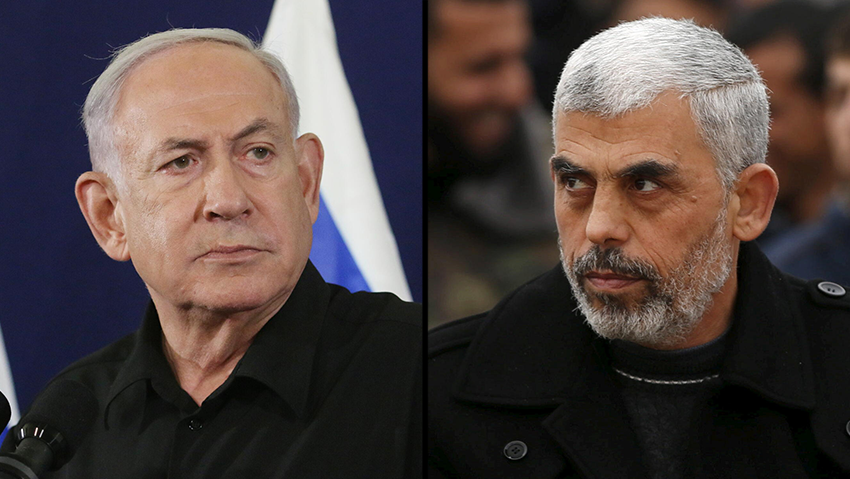Israeli officials voiced pessimism Wednesday night after Hamas presented its response to its cease-fire proposal, dubbing it “one of the most extreme possible.”
Israeli officials who analyzed Hamas' response concluded that the chances of a deal under these conditions are negligible. Israeli sources described Hamas' reply to U.S. President Joe Biden's proposal as a "non-starter" and criticized Washington's involvement.
2 View gallery


Prime Minister Benjamin Netanyahu and Hamas leader in Gaza Yahya Sinwar
(Photo: Dana Kopel, Reuters)
On Wednesday evening, Prime Minister Benjamin Netanyahu held a phone consultation with top security officials following Hamas' response. Senior Israeli officials said that Hamas perceives Israel as being in a difficult position, allowing them to set unrealistic conditions.
For instance, Hamas opposes giving Israel veto power over the release of high-profile prisoners in exchange for abducted soldiers, even though Israel agreed to compromise by retaining veto power over only half of the 200 high-profile prisoners expected to be included in the deal.
Additionally, Hamas demands to advance the timeline for Gaza's reconstruction from phase three of the agreement to phase one, insists on the immediate removal of the Israeli-established Netzarim Corridor—which bisects the northern and southern parts of the Palestinian enclave—and refuses to agree to a deadline for renewing hostilities if no agreement is reached on phase two. Hamas firmly rejects Israel's demand to deport freed Palestinian prisoners, insisting they be released to their places of origin, including the West Bank.
Hamas also demands guarantees from China, Russia and Turkey for ending the conflict, in addition to U.S. assurances, a condition Israel deems unacceptable. Senior Israeli officials indicated that Hamas in Gaza leader Yahya Sinwar distrusts Israel and believes Israel will sabotage the agreement over minor issues. Thus, Sinwar insists on resolving everything before the first phase, ensuring Israel enters the humanitarian phase knowing the war is over with no exit strategy.
Unlike in the past, where the ball was in Israel's or Hamas's court, officials noted that it is now in Washington's court. While the Americans also reject Hamas's demands, Israeli officials believe the U.S. lacks leverage over Qatar, which has not imposed any sanctions on Hamas, such as expelling its members or seizing bank accounts.
"It's hard to see how a deal will be made. From the Israeli side, Hamas' response is a rejection of the agreement," sources told Ynet.
US Secretary of State Antony Blinken addresses changes proposed by Hamas to cease-fire deal
(Video: Reuters)
On Wednesday evening, U.S. Secretary of State Antony Blinken said that Hamas has presented a counterproposal describing some of the amendments as "workable" while others are not. He added that Washington would present in the coming weeks a plan for governing post-war Gaza, saying that Hamas "must not be allowed" to dictate the future of the Palestinian enclave.
The Hostages and Missing Families Forum said that Hamas's announcement is “an integral part of the negotiation process.”
“This is another stage in the path toward the Netanyahu deal, which is the first Israeli initiative put on the table since October 7,” a statement read.
“The Families Forum supports U.S. Secretary of State Antony Blinken's statement today that it is possible to bridge the gaps. In his meeting with representatives of the hostage families yesterday, Blinken emphasized his commitment and that of the United States to advancing a deal for the return of the hostages.
"All parties must immediately and intensively continue negotiations to bridge the remaining gaps. The Netanyahu deal is very good for Israel. It allows the country to maximize its military achievements and achieve significant political gains."






